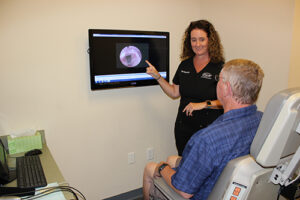Hoarseness, an abnormal change in your voice, can be the result of a disorder in the larynx (voice box). Your voice may sound strained and raspy when you are hoarse. There may also be changes in pitch and volume of your voice.
Causes and Concerns
When you breathe, the vocal cords normally remain separated. When you speak or sing, the cords vibrate together. Lesions or swelling of the cords can affect these vibrations and change your voice’s volume, pitch and/or quality. Acute laryngitis is the most common cause of hoarseness. Laryngitis can result from swelling of the vocal cords from voice strain, common colds or upper respiratory tract infections. Other causes of hoarseness include:
- Benign Vocal Cord Lesions: Lesions on the vocal cords can result from voice overuse or misuse over a long period of time. Bad voice habits can result in the formation of polyps, cysts or nodules. The latter are characterized by callus-like vocal cord growths. Cysts and polyps can develop whether you misuse your voice or not.
- Vocal Hemorrhage: If you suddenly lose your voice after yelling or some other strenuous use of your voice, you may have suffered a vocal cord hemorrhage. This happens when a blood vessel ruptures on the surface of the cords and soft tissues fill with blood. Considered a vocal emergency, voice rest and examination by a throat specialist (otolaryngologist) is required.
- Gastro-esophageal Reflux (GERD): Another cause of hoarseness is gastro-esophageal reflux. Stomach acids back up into the esophagus (swallowing tube) irritating the vocal cords. Other symptoms of GERD are regurgitation and/or heartburn. A patient’s voice will be worse in the morning then recover. They can have the feeling of a lump and/or mucus in the throat and a constant urge to clear it.
- Laryngopharyngeal Reflux (LPR): When the reflux makes it into the back part of the throat, it is known as LPR . The larynx, pharynx and lungs are very sensitive to stomach acids/digestive enzymes, so small amounts of reflux can cause symptoms. Often patients who suffer from LPR do NOT feel any heartburn or regurgitation of stomach acid.
- Smoking: Smoking can also cause hoarseness and it is the main cause of throat cancer. Therefore, if smokers develop hoarseness, they should consult an otolaryngologist promptly for a thorough examination.
- Neurological Disorders: Hoarseness can develop in individuals who have neurological disorders like Parkinson’s, stroke or spasmodic dysphonia (a rare neurological disorder affecting only the voice and occasionally breathing). Paralyzed vocal cords could be another rare reason for a weak voice. If hoarseness lasts for longer than three months and other reasons disproven, you should see an otolaryngologist.
- More Causes: Larynx damage, allergies, and thyroid conditions all can lead to hoarseness. Dangerous conditions, including laryngeal cancer, can cause hoarseness. This is why it is very important to have prolonged hoarseness evaluated as soon as possible.
Symptoms and Signs
There are many other symptoms and signs that accompany hoarseness. Some of these are indicators of a serious underlying health problem. You should see a throat specialist if you have any of the following:
- Hoarseness persisting for more than three weeks, especially if you are a smoker
- No other symptoms of a cold/flu
- Coughing up blood
- Difficulty swallowing
- A lump in your neck or throat
- Changes in your voice which last for more than a few days
- Pain when speaking and swallowing
- Difficulty breathing along with your voice change(s)
- A singer who cannot perform
Solutions and Options
To find a solution and offer you options, one of the throat specialists at Vero ENT Associates will take a complete history and do a physical examination. An examination of the vocal cords by laryngoscopy will likely be advised. This simple procedure is performed in the office and just takes a few seconds to complete.
Videostroboscopy
 Sometimes a more detailed evaluation of the voice is recommended and a videostroboscopy will be performed. This is a specialized voice evaluation that demonstrates the structure and function of the larynx in more detail and is conducted by a certified Speech and Language Pathologist. Vero ENT Associates has a highly qualified and experienced Speech and Language Pathologist and the specialized equipment to perform this test right in the office.
Sometimes a more detailed evaluation of the voice is recommended and a videostroboscopy will be performed. This is a specialized voice evaluation that demonstrates the structure and function of the larynx in more detail and is conducted by a certified Speech and Language Pathologist. Vero ENT Associates has a highly qualified and experienced Speech and Language Pathologist and the specialized equipment to perform this test right in the office.
Summary
Regardless of the cause of your hoarseness, not smoking and staying away from secondhand smoke is always in your best interest. If you or someone you know has hoarseness or any of the symptoms associated with this condition, contact our office for an appointment. The caring physicians and nurse practitioner at Vero ENT Associates can help you find a solution to your symptoms.
Additional Reading: http://www.entnet.org/HealthInformation/hoarseness.cfm
